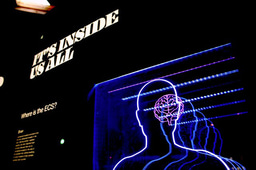Why are we so bad with money? The psychological battle of the id and exploitation
Published in Behavioural Sciences & Psychology

According to a recent Bankrate survey, 27% of Americans say they have less savings in 2025 compared to one year ago1. Worryingly, 13% of respondents claim that they have no emergency savings now, and didn’t one year ago.
Another poll published by Yahoo! Finance found that only 22% of Americans were completely satisfied with the amount of money they have in savings2.
In recent years, individuals in the United States and throughout the world have struggled to overcome many economic headwinds stemming from high inflation rates, a greater cost of borrowing through interest rate hikes, and an increase in the cost of living.
However, as fintech and other technological advances continue to emerge, it’s becoming increasingly clear that as consumers, we’re facing an unprecedented battle to save against the backdrop of marketers and brands seeking to encourage reckless spending at scale.
In the battle between our id, ego, and superego, our impulses never stood a chance.
The psychology of spending
To anyone who studied psychology at school, Freud’s Theory of Personality, which explains that all of us have an id, ego, and superego comprised within our personalities, is likely to be a familiar topic when analyzing any habits that appeal to the impulse of its subjects.
The id, which represents our unconscious, primal desires and instincts, is driven by the pursuit of instant gratification. According to Freud, it’s the id that’s telling you to pick up a takeaway after work rather than cook a balanced meal when you’re home. It’s also your id that demands you make impulsive purchases regardless of your financial health.
The id is in constant disagreement with our superego, which acts as our moral judge and generates feelings of guilt, or buyer’s remorse, as a result of our contentious actions. But it falls on the responsibility of our ego as our conscious personality to strike a balance between our impulses and critical thinking.
It’s fair to say that our id, ego, and superego haven’t evolved fast enough to cope with the sensory overload of 21st Century marketing. At a time when our impulses are facing stimulation from all angles, you’d have to wonder what Freud would’ve made for his Theory of Personality. Perhaps he’d be too busy falling into the trap of consumerism to consider it for himself.
Living with new pressures
Interestingly, money and health appear to form a symbiotic relationship3. For instance, feeling unwell can prompt our impulsive id to spend in an attempt to gain instant gratification and feel better.
Likewise, those living with addictive tendencies could spend more money if they are addicted to gambling. If you’re experiencing symptoms of mania or hypomania you may be prone to more impulsive financial decisions.
However, these health-driven impulses can cause you to experience more anxiety over your spending, experience sleep problems, or lead to feelings of loneliness and isolation from those close to you.
This worrying cycle of health-related spending could be exacerbated by the United States’ struggles on the World Happiness Report, which saw the nation drop to an all-time low to 23rd place in 20244.
With the report highlighting a higher volume of young people experiencing unhappiness due to feeling less supported by their loved ones and less confident in government, these negative feelings could lead younger Americans to give in to their id, and feelings of impulsiveness more frequently.
Brains don’t want to save
According to Adam Anderson, associate professor of human development at Cornell University, our brains are simply uninterested in saving money.
The paper, Differential Temporal Salience of Earning and Saving, which Anderson co-authored with Kesong Hu and Eve De Rosa, sought to examine why we’re such poor savers despite being willing spenders5.
Anderson surmised that saving is fundamentally less valuable to human brains, which are unwilling to spend time figuring out.
Our brains are less attentive towards making ends meet and looking after our finances. Despite this, the study shows a cognitive bias in favor of earning that’s so powerful that we perceive saving to be less urgent than earning.
Time appears to be a key factor in these mental gymnastics. Because we’re saving for a rainy day, retirement, or a one-off purchase in the future, our brains dismiss its urgency as an issue for another time.
Our IDs are being exploited
To make our appetite for saving even more challenging, we appear to be living in an age of unprecedented ‘greedflation’ among global customer-facing corporations.
According to European Central Bank (ECB) data, the rising cost of living and high inflation rates have been, in part, down to higher levels of profit-taking among companies6.
The rate of unit profit growth had even overtaken wage growth as a leading contributor to price inflation throughout Europe by late 2022.
This indicates a wider trend that our impulses are being exploited in a way that actively encourages irresponsible spending.
There are many different tricks that companies use to exploit our ids. These include over-emphasizing the scarcity of products, adding social proofs to show advocacy, framing products online to retain our attention, and reducing friction at the checkout7.
One of the biggest psychological dangers for our impulses to resist is the emergence of buy now pay later (BNPL).
As one of the leading financial trends of the post-pandemic years, BNPL offers real-time payment processing without consumers having to pay the full price of goods upfront8. This means that users can spread costs in a way that’s usually free of interest.
Because BNPL appeals in a similar way to how our brains process the concept of saving as a responsibility for the future, as Anderson warned us, there are high risks associated with offsetting payments and the potential for it sparking a cycle of debt.
Buy now pay later is growing at an impressive pace. Consumers spent a total of $75.1 billion using BNPL in 2023, up some 14% from the $65.6 billion spent in 20229.
Although young Americans may be more confident about becoming wealthy in their lifetimes, the 55% of Millennials and 51% of Gen Z who have used BNPL services may be facing unprecedented challenges in their ability to save due to fintech removing the barriers used by our superego to keep our ids in check.
With the ability to make purchases even when you don’t have the money in your bank account, instant gratification can lurk everywhere.
How can we control our spending?
According to Shang Saavedra, author of Wealth Is a Mindset: Change Your Mind, Change Your Money, our spending impulses can be triggered by a number of factors.
The money coach created the acronym HALTS as a means of helping individuals to understand their triggers. HALTS stands for hungry, angry or anxious, lonely, tired, and sad or stressed10.
Saavedra believes that these negative emotions can trigger impulsive spending, and learning to recognize them can help to keep you mindful of your spending.
To put this into action, Saavedra recommends writing down what caused you to make your purchase, and what you expected to achieve from it. In recognizing your triggers, it’s possible to rewire them. For instance, if you’re feeling stressed, you could plan a walk rather than take to retail therapy.
Despite the negative cycle that consumers can find themselves in when making excessive purchases, Dr Johanna Peetz, a psychology professor at Carleton University, believes that you should always take a compassionate tone with yourself, and remember that past decisions don’t define you11.
Peetz offers a more practical approach to interrupt your id’s instant gratification demands. Placing your credit cards in ice cube trays, blocking websites that trigger your spending impulses, and carrying cash only when shopping may not serve as a psychological failsafe when you’re determined to spend money, but they can slow your path to purchase down long enough for your superego enter the chat. These delays allow you to think more critically about your impulses.
Resisting sensory overloads
If you make an impulsive purchase, don’t worry. Retailers have been attempting to appeal directly to our ids for centuries now and technology is only helping their marketing attempts to become more robust.
At a time of sensory overloads, advertising that creates urgency, and sales designed to force us into spending money, knowing your mind and your triggers can be a great way to resist even temptation.
Sigmund Freud may not have lived in the age of hyper-focused 21st Century marketing and BNPL to recognize its impact on our ids, but he would’ve still maintained that we could find strength in balancing our impulses with our ego and superego.
By fighting back to rationalize our spending urges, Saavedra and Peetz believe that we can bypass our desire for instant gratification. If it helps to maintain an equilibrium between our wants and needs, it could go some way to improving our relationship with money.
References
1 Gillespie, Lane. 2025. “Bankrate's 2025 Emergency Savings Report.” Bankrate. https://www.bankrate.com/banking/savings/emergency-savings-report/#more-than-1-in-4-americans-have-less-savings-year-over-year.
2 Pino, Ivana. 2025. “Most Americans are dissatisfied with their savings, survey shows.” Yahoo Finance. https://finance.yahoo.com/personal-finance/banking/article/state-of-savings-report-110009028.html.
3 “The link between money and mental health.” n.d. Mind. Accessed February 20, 2025. https://www.mind.org.uk/information-support/tips-for-everyday-living/money-and-mental-health/the-link-between-money-and-mental-health/.
4 Saric, Ivana. 2024. “America's happiness hits new low, per World Happiness report.” Axios. https://www.axios.com/2024/03/20/world-happiness-america-low-list-countries.
5 Anderson, Adam, Kesong Hu, and Eve De Rosa. 2018. “Differential temporal salience of earning and saving.” Nature. https://www.nature.com/articles/s41467-018-05201-9.
6 Conway, Ed. 2023. “'Greedflation' explored: Are businesses making inflation worse through excessive profits?” Sky News. https://news.sky.com/story/greedflation-explored-are-businesses-making-inflation-worse-through-excessive-profits-12877683.
7 Bushi, Ruth. 2020. “The tactics retailers use to make us spend more – and how they harm the vulnerable.” The Guardian. https://www.theguardian.com/money/2020/dec/05/retailers-spend-more-online-stores.
8 “Payment Trends: The Evolution of Transactions in Business.” 2025. Epos Now. https://www.eposnow.com/uk/resources/payment-trends/.
9 Ngo, Hien A. 2024. “Why more Americans are turning to Buy Now, Pay Later payment plans, in 4 charts.” CNN. https://edition.cnn.com/2024/12/15/business/buy-now-pay-later-services-shopping-dg/index.html.
10 Saavedra, Shang. 2024. “I’m a Money Coach: Here’s How to Stop Overspending and Build Healthy Money Habits.” CNET. https://www.cnet.com/personal-finance/banking/advice/im-a-money-coach-heres-how-to-stop-overspending-and-build-healthy-money-habits/.
11 Gilbert, Elizabeth. 2022. “Overspending? Psychological tips to break the cycle.” Big Think. https://bigthink.com/sponsored/stop-overspending-behaviors/.





Please sign in or register for FREE
If you are a registered user on Research Communities by Springer Nature, please sign in